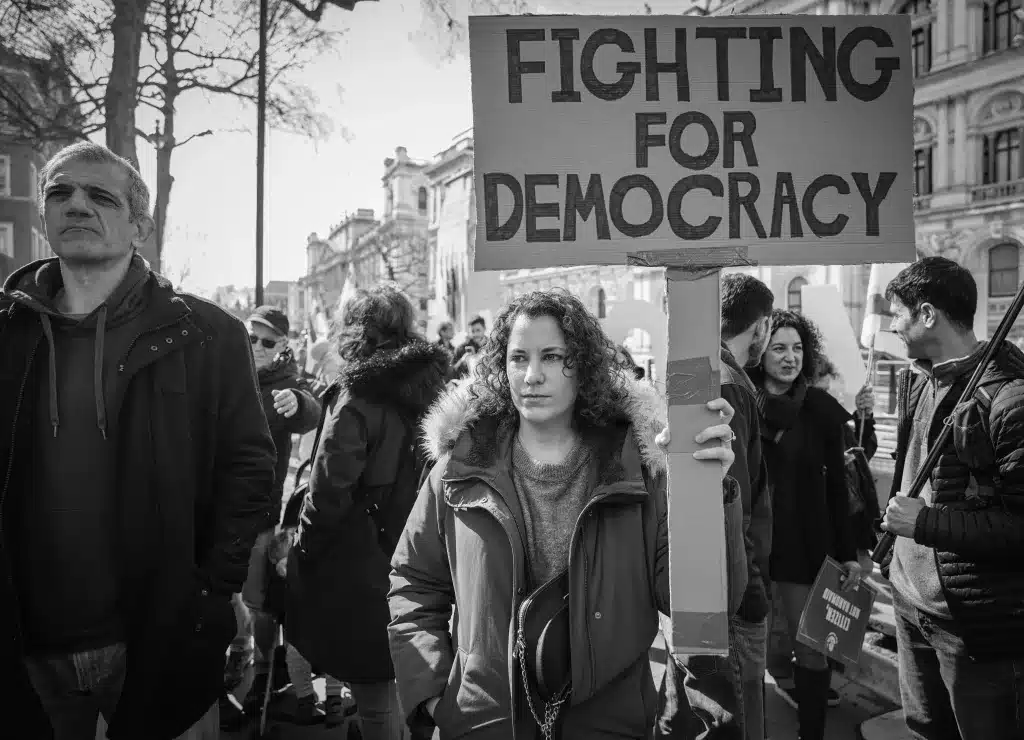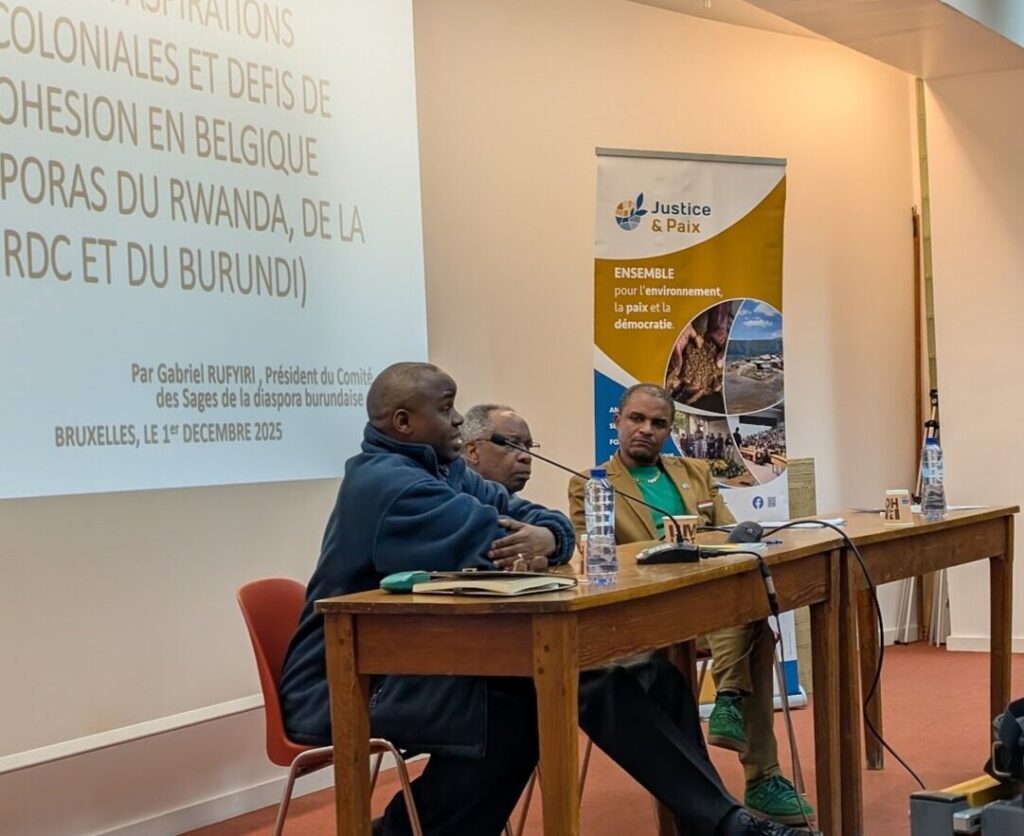The world is often racked by seemingly intractable conflicts, whirlwinds of disagreement and tension beyond resolution. Non-violent discussion is an essential component of democracy, providing a constructive means of resolving disputes.

The world is often racked by seemingly intractable conflicts, whirlwinds of disagreement and tension beyond resolution. The Israeli-Palestinian conflict is an example. This article explores the principles that could serve as a basis for resolving this conflict and draws on the experience of the Truth and Reconciliation Commission set up in South Africa.
THE ISRAEL-PALESTINIAN CONFLICT: A COMPLEX CONTEXT
The history of the Israeli-Palestinian conflict goes back many decades. Key events, such as the Balfour Declaration of 1917 and the Arab-Israeli War of 1948, marked important turning points[1] [2]. They left deep scars and helped shape the current dynamics of the conflict. Regional and global players play a key role[3] [4]. At the heart of the dispute are competing territorial and national claims, refugee rights, the question of Jerusalem, resource sharing, inequality and security. Divergent interpretations of history and historical rights complicate the problem.
THE FOUNDATIONS OF DEMOCRACY AND PEACE
Democracy, as a political system, offers fundamental principles that can serve as a guide for conflict resolution. The sovereignty of the Nation[5], non-violent deliberation, non-discrimination, reduction of social inequalities, and respect for human rights are essential democratic pillars.
The sovereignty of the Nation, a fundamental principle of democracy, emphasizes the right of people to determine their own political destinies. In the Israeli-Palestinian context, this translates into the recognition of the right to self-determination of both peoples. Peace negotiations should respect this sovereignty and work toward the creation of viable, sovereign states for Israelis and Palestinians.
Non-violent discussion is an essential component of democracy, providing a constructive means of resolving disputes. Israeli-Palestinian peace talks have often been hampered by violence, undermining trust and making resolution of the conflict even more difficult.
The Israeli-Palestinian conflict is marked by accusations of discrimination, whether based on religion, ethnicity, or nationality. Building peace requires the elimination of all forms of discrimination, ensuring equal rights and opportunities for all.
A democratic approach requires promoting equitable distribution of resources and opportunities, thereby reducing inequalities and creating conditions conducive to peaceful coexistence.
Respect for human rights is a central pillar of democracy and an essential element of conflict resolution. Peace negotiations must ensure respect for basic human rights for all individuals involved. Mutual recognition of suffering and legitimate rights helps create a solid basis for reconciliation.
Democracy, with its fundamental principles, can thus serve as a framework for the search for peace in the Israeli-Palestinian conflict. By emphasizing the sovereignty of the Nation, non-violent discussion, non-discrimination, reduction of social inequalities, and respect for human rights, efforts to resolve this conflict can be guided by just and equitable principles. .
SOUTH AFRICA AS A MODEL OF RECONCILIATION
South Africa's transition from apartheid to democracy offers valuable lessons for other conflicts, including the Israeli-Palestinian conflict.
Alongside their specificities, the situations in Israel-Palestine and apartheid South Africa present similarities, particularly in terms of segregation, discrimination, inequitable sharing of territory and resources, lack of freedom of movement. , population displacement, violence, repression.
South Africa managed to negotiate a peaceful transition, one of the most remarkable aspects of which was the creation of the Truth and Reconciliation Commission (TRC). This allowed victims and perpetrators of atrocities to testify, confess their crimes and seek reconciliation[6]. The TRC played a crucial role in healing and repair.
Reconciliation in South Africa has shown that it is possible to overcome deep divisions through dialogue, truth and justice.
The Truth and Reconciliation Commission has been a crucial instrument for addressing past injustices. A similar approach could be considered to overcome deep divisions in the Israeli-Palestinian conflict.
The participation of all stakeholders, including marginalized groups, has been essential in South Africa. In the Israeli-Palestinian conflict, a lasting solution could be fostered by an inclusive approach involving all parties, including the diverse Palestinian and Israeli communities.
Direct negotiations played a crucial role in South Africa's transition. Encouraging direct and sincere talks between Israelis and Palestinians could be a way to build the trust needed to resolve the conflict.
The transition from apartheid in South Africa was characterized by a move towards inclusive democracy. In the Israeli-Palestinian context, the promotion of democratic principles and the guarantee of rights for all communities could be key elements of a peaceful solution.
The figure of Nelson Mandela in South Africa played a major role in inspiring and unifying the country. Inspirational leadership, capable of transcending divisions, could be a vital catalyst for progress toward peace in the Middle East.
Reducing social and economic inequality has been a key goal in post-apartheid South Africa. Addressing inequalities in the Israeli-Palestinian conflict could help create fertile ground for peaceful coexistence.
While taking into account the specificities of each context, it is important to consider the principles of justice, democracy, reconciliation, dialogue and inclusion as the foundations for the resolution of any conflict, including the Israeli-Palestinian conflict.
JUSTICE AND DEMOCRACY IN THE RESOLUTION OF THE ISRAEL-PALESTINIAN CONFLICT
To achieve a sustainable solution, several key elements must be taken into account. The few general principles below can facilitate understanding of how justice and democracy could contribute to the resolution of the Israeli-Palestinian conflict.
It would be useful, to help resolve the conflict:
- To open the field of discussion and exchange to all groups, organizations, etc. of Israeli and Palestinian societies and not to limit it to the most bellicose forces,
- To ask ourselves what would be the broad outlines of a state and society project that would best respond (or at least better than now) to the aspirations of both Israelis and Palestinians (people in the flesh),
- To examine the question of reconciliation and that of deliberation in deeply divided societies,
- To address the issue of institutional, legal and other guarantees to guarantee the rights and security of all,
- To address the question of justice and inequalities,
- To rely on non-discrimination as the foundation of the transition process.
Human rights must be at the heart of any democratic discussion on conflict resolution. This includes respecting the rights to self-determination, security, equality and dignity for all parties involved[7].
International actors have a key role to play in promoting justice and peace. International pressure, mediation and the efforts of the international community can support the conflict resolution process[8] [9].
Paulin MBecke.
[1] Khalidi, W. (2007). The Iron Cage: The Story of the Palestinian Struggle for Statehood. Beacon Press.
[2] Shlaim, A. (2007). The Iron Wall: Israel and the Arab World. WW Norton & Company.
[3] Said, E.W. (1979). The Question of Palestine. Vintage.
[4] Farsakh, L. (2005). Palestinian Labor Migration to Israel: Labor, Land, and Occupation. Routledge.
[5] Here we must distinguish the sovereignty of the Nation from national sovereignty. The first refers to the fact that political power is supposed to emanate from the Nation and be responsible to it. It is an essential foundation of democracy. The second concerns any political regime, including authoritarian or totalitarian, and is often invoked to justify acts in conflict with rights, justice and peace.
[6] Tutu, D. (1999). No Future Without Forgiveness. Picture.
[7] An-Na’im, A.A. (2008). Human Rights in Cross-Cultural Perspectives: A Quest for Consensus. University of Pennsylvania Press.
[8] Dawisha, A.I. (2005). Arab Nationalism in the Twentieth Century: From Triumph to Despair. Princeton University Press.
[9] Stern, Y. (2018). The Conflict Over the Conflict: The Israel/Palestine Campus Debate. SUNY Press.



